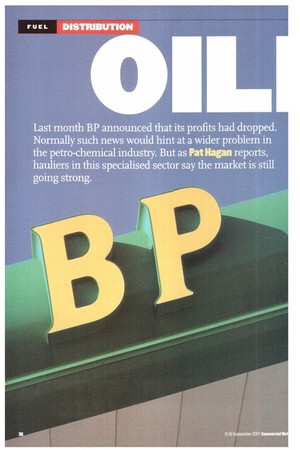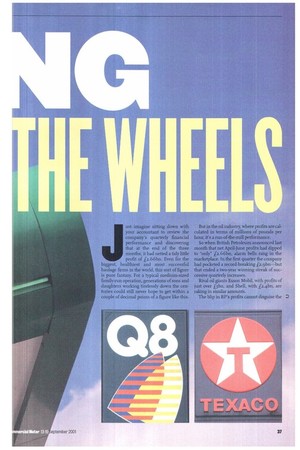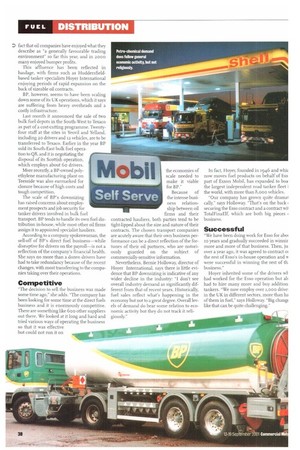Last month BP announced that its profits had dropped.
Page 36

Page 37

Page 38

If you've noticed an error in this article please click here to report it so we can fix it.
Normally such news would hint at a wider problem in
the petro-chemical industry. But as Pat Hagan reports,
hauliers in this specialised sector say the market is still going strong.
iillust imagine sitting down with your accountant to review the company's quarterly financial performance and discovering that at the end of the three months, it had netted a tidy little profit of f2.66bn. Even for the biggest, healthiest and most successful haulage firms in the world, this sort of figure is pure fantasy. For a typical medium-sized family-run operation, generations of sons and daughters working tirelessly down the centuries could still never hope to get within a couple of decimal points of a figure like this.
But in the oil industry, where profits are calculated in terms of millions of pounds per hour, it's a run-of-the-mill performance.
So when British Petroleum announced last month that net April-June profits had dipped to "only" L2.66bn, alarm bells rang in the marketplace. In the first quarter the company had pocketed a record-breaking f2.9bn—but that ended a two-year winning streak of successive quarterly increases.
Rival oil giants Exxon Mobil, with profits of just over bbn, and Shell, with /2.4bn, are raking in similar amounts.
The blip in BP's profits cannot disguise the
fact that oil companies have enjoyed what they describe as "a generally favourable trading environment" so far this year, and in 2000 many enjoyed bumper profits.
This affluence has been reflected in haulage, with firms such as Huddersfieldbased tanker specialists Hoyer International enjoying periods of rapid expansion on the back of sizeable oil contracts.
BP, however, seems to have been scaling down some of its UK operations, which it says are suffering from heavy overheads and a costly infrastructure.
Last month it announced the sale of two bulk fuel depots in the South-West to Texaco as part of a cost-cutting programme. Twentyfour staff at the sites in Yeovil and Yelland, including zo drivers and iz vehicles, are to be transferred to Texaco. Earlier in the year BP sold its South-East bulk fuel opera tion to Q8, and it is negotiating the disposal of its Scottish operation, which employs about Go drivers.
More recently, a BP-owned polyethylene manufacturing plant on Teesside was also earmarked for closure because of high costs and tough competition.
The scale of BP's downsizing has raised concerns about employment prospects and job security for tanker drivers involved in bulk fuel transport. BP tends to handle its own fuel distribution in-house, while most other oil firms assign it to appointed specialist hauliers.
According to a company spokeswoman, the sell-off of BP's direct fuel business—while disruptive for drivers on the payroll—is not a reflection of the company's financial health. She says no more than a dozen drivers have had to take redundancy because of the recent changes, with most transferring to the companies taking over their operations.
Competitive
"The decision to sell the business was made some lime ago," she adds. The company has been looking for some time at the direct fuels business and it is enormously competitive. There are something like Goo other suppliers out there. We looked at it long and hard and tried various ways of operating the business so that it was effective but could not run it on the economies of scale needed to make it viable for BP."
Because of the intense business relationship between oil firms and their contracted hauliers, both parties tend to be tight-lipped about the size and nature of their contracts. The chosen transport companies are acutely aware that their own business performance can be a direct reflection of the fortunes of their oil partners, who are notoriously guarded on the subject of commercially-sensitive information.
Nevertheless, Bernie Holloway, director of Hoyer International, says there is little evidence that BP downsizing is indicative of any wider decline in the industry: "I don't see overall industry demand as significantly different from that of recent years. Historically, fuel sales reflect what's happening in the economy but not to a great degree. Overall levels of demand do bear some relation to economic activity but they do not track it religiously."
Self Serve
In fact, Hoyer, founded in 1946 and whic now moves fuel products on behalf of Ess part of Exxon Mobil, has expanded to boa the largest independent road tanker fleet I the world, with more than 8,000 vehicles. "Our company has grown quite dramal cally," says Holloway. "That's on the back securing the Esso contract and a contract wil TotalFinaElf, which are both big pieces 1 business.
Successful
"We have been doing work for Esso for aboi To years and gradually succeeded in winnir more and more of that business. Then, ju over a year ago, it was agreed to contract oi the rest of Esso's in-house operation and v were successful in winning the rest of th business."
Hoyer inherited some of the drivers wlhad worked for the Esso operation but ab had to hire many more and buy addition tankers. "We now employ over 1,000 drive: in the UK in different sectors, more than ha of them in fuel," says Holloway. "Big chang■ like that can be quite challenging."








































































































































